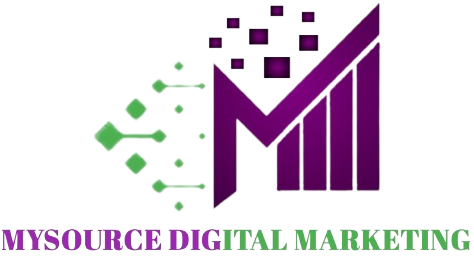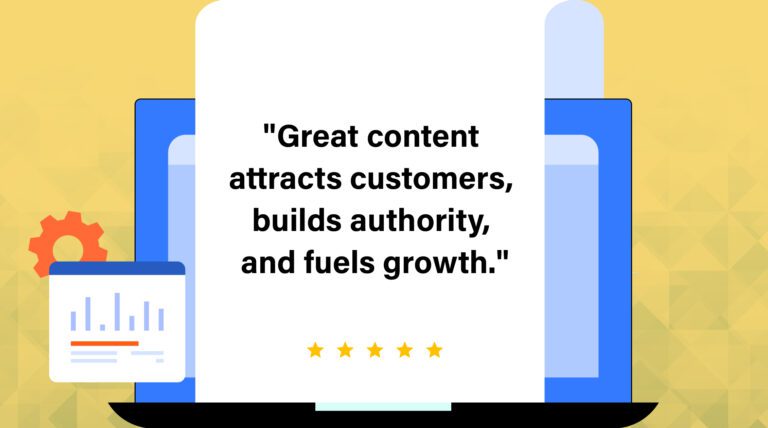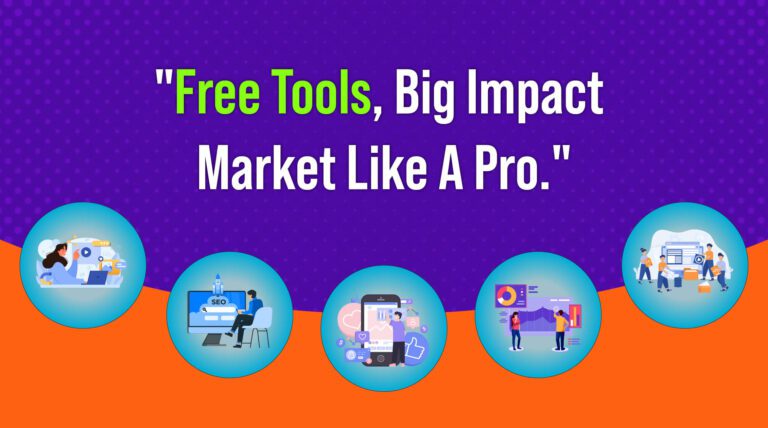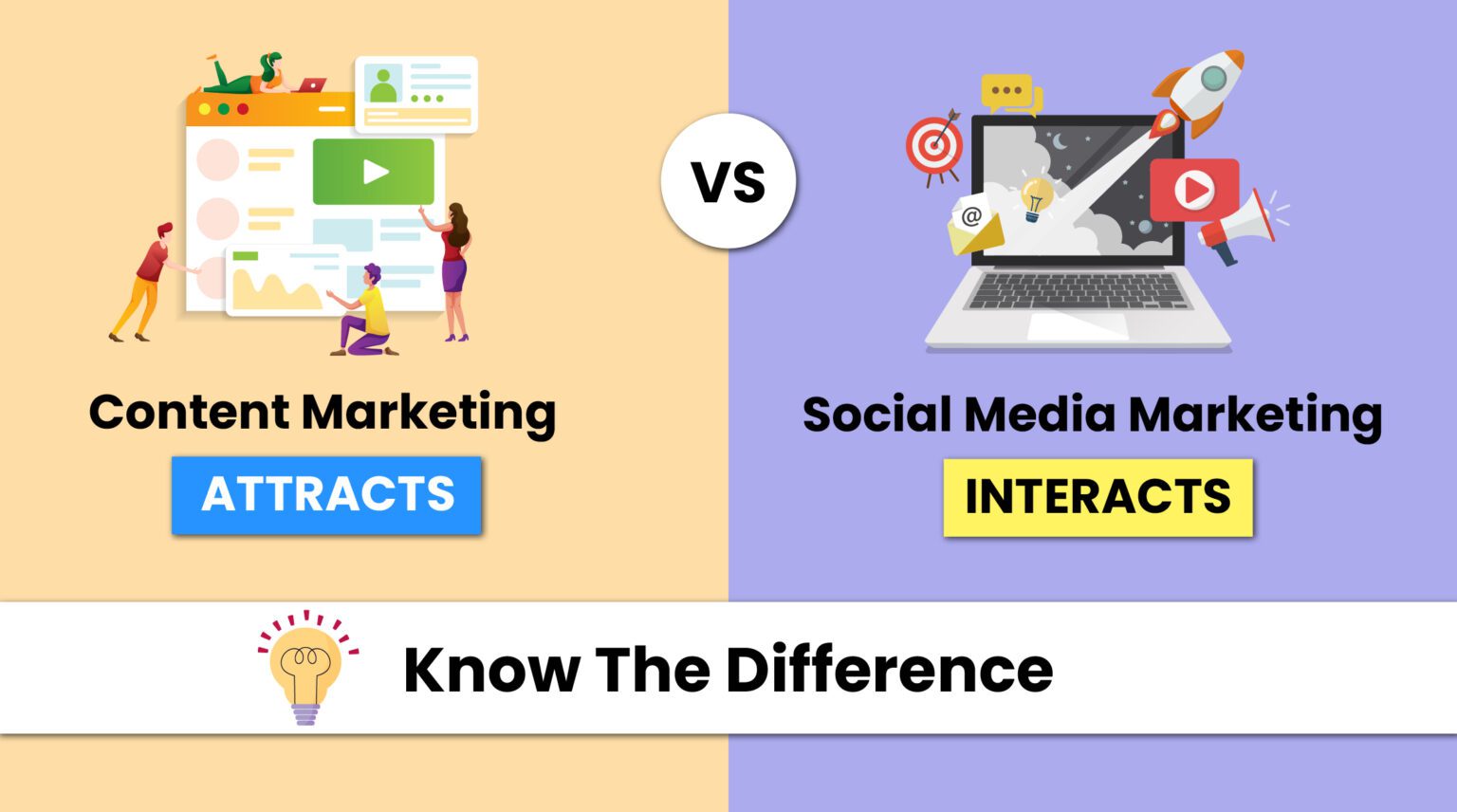
When it comes to growing your brand online, two primary strategies come to mind: content marketing and social media marketing. While they often work hand-in-hand, they fulfill different purposes and require distinct approaches.
Understanding the differences between content marketing and social media marketing is crucial to deciding where to focus your time, energy, and budget. This post breaks down their definitions, goals, formats, channels, and more to help you create a winning strategy. Plus, you’ll learn how to integrate these powerful techniques for even better results.
1. Definition and Focus
What Is Content Marketing?
“Content marketing focuses on creating and sharing valuable information to educate, inform, and build trust with your audience. According to the Content Marketing Institute,
“Content marketing is a strategic marketing approach focused on creating and distributing valuable, relevant, and consistent content to attract and retain a clearly defined audience — and, ultimately, to drive profitable customer action.”
To learn more about effective content marketing strategies, check out our content marketing services designed to help you grow your brand with value-driven content
Examples of content marketing include:
- Blog posts
- eBooks
- Whitepapers
- Videos
- Infographics
This strategy helps companies position themselves as industry experts and build long-term relationships with their audience.
Key Focus: Slow and steady relationship-building through valuable content.
What Is Social Media Marketing?
Social media marketing revolves around promoting your brand or products on platforms like Facebook, Instagram, Twitter, and LinkedIn. It’s all about engaging with users, running ads, and sharing updates to connect with your audience in real-time. Explore our social media services to boost engagement and build real-time connections.
Examples of social media activities include:
- Posting updates and images
- Running ads
- Hosting live and webinars
- Directly interacting with followers
Key Focus: Immediate interaction and real-time engagement with users.
2. Content Formats
Content Marketing Formats
Content marketing allows for in-depth exploration of topics using various formats designed for long-term engagement. These include:
- Blog Posts: Educational or entertaining articles that drive organic traffic.
- Videos: High-value tutorials or visual storytelling.
- Whitepapers and eBooks: Long-form, detailed content.
- Infographics: Visually appealing graphics for simplified information.
Social Media Marketing Formats
Social media platforms prioritize bite-sized, shareable content that grabs attention quickly. These formats include:
- Short Posts or Tweets: Quick messages to spark conversations.
- Stories: Temporary, engaging content to drive instant reactions.
- Memes and GIFs: Fun content to entertain and get shares.
- Live Videos: Real-time engagement opportunities with followers.
The difference lies in how each medium connects with its audience; content marketing takes a deep dive approach, while social media marketing keeps it brief and reactive.
3. Distribution Channels
Content Marketing Channels
Content marketing utilizes platforms you control to distribute content effectively. These include:
- Your Website or Blog: A hub for your educational materials.
- Email Newsletters: Direct updates to your audience’s inboxes.
- SEO Optimization: Leveraging keyword-optimized content to appear in search engines.
Social Media Marketing Channels
Social media marketing uses third-party platforms to meet users where they already hang out. Examples are:
- Social Media Profiles: Regular posts and interactive content.
- Paid Ads: Boosted visibility for specific audience segments.
- Influencers: Partnering with prominent voices to extend reach.
While content marketing relies on owned channels, social media marketing thrives on interacting within public spaces.
4. Goals and Objectives
What Does Content Marketing Aim to Achieve?
This strategy is all about the bigger picture, aiming for long-term rewards:
- Build Brand Authority: Position yourself as an expert.
- Nurture Leads: Guide prospects through the buying process.
- Create Evergreen Value: Generate resources that remain valuable over time.
What Does Social Media Marketing Aim to Achieve?
Social media prioritizes quick results and real-time interaction:
- Boost Engagement: Increase likes, shares, and conversations.
- Gain Visibility: Generate awareness fast through trends.
- Drive Traffic: Send followers to your website or landing pages.
Knowing these goals helps you decide which strategy to prioritize based on your business needs.
5. Measurement and Analytics
Content Marketing Metrics
Content marketing success is often measured by long-term engagement:
- Website Traffic: How many visitors does your content attract?
- Time on Page: How long users stay on your content.
- Lead Conversion: How well your content turns readers into customers.
Use tools like Google Analytics to track your content performance and optimize what works.
Social Media Marketing Metrics
Social media marketing focuses on immediate interactions and reach:
- Likes, Shares, and Comments: How many people enjoy your posts?
- Follower Growth: How many new people join your audience?
- Ad Performance: Tracking clicks, conversions, and impressions from ads.
The insights from these metrics guide you in optimizing future campaigns.
Content Marketing and Social Media Marketing: How to Integrate Them?
While content marketing and social media marketing serve different purposes, integrating them can create a powerful effect that amplifies your brand’s reach and engagement. Here’s how you can do it:
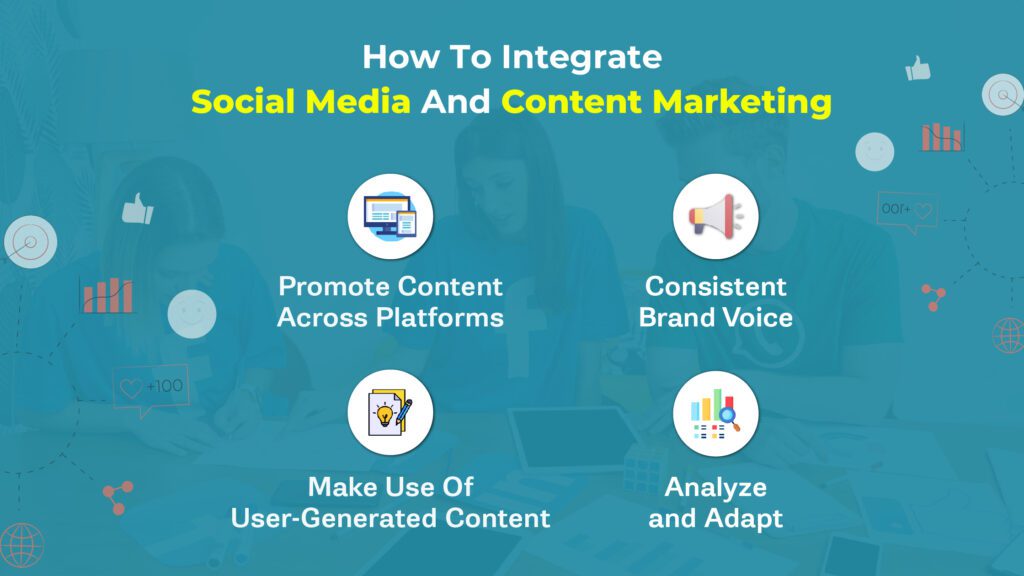
1. Promote Content across Platforms
Social media is a great way to spread your content to more people. Think of your social media accounts as loudspeakers for your content marketing. For instance, let’s say you write a detailed blog post. You can take the main ideas from that post and turn them into shorter, easy-to-share posts for platforms like Facebook, Twitter, or Instagram. These short posts can give people a taste of what’s in your full blog article.
When you share these bits and pieces on social media, make sure to include a link back to your website where the full blog post is. This way, you’re using social media to get more people to visit your website and read your content. It’s like leaving a trail of breadcrumbs on social media that leads people back to your main content. This method helps your content reach a wider audience and can bring more visitors to your website.
2. Make use of User-Generated Content
Ask your fans and customers to create content about your brand and share it on social media. This could be photos of them using your products, reviews, or stories about their experiences with your brand. When people do this, it’s called user-generated content. You can then use this content in your marketing. For example, you might feature a customer’s photo on your website or use a great review in an email newsletter. This approach helps build trust because potential customers see real people enjoying your products or services.
3. Consistent Brand Voice
Throughout all your marketing efforts, it’s important to maintain the same message and tone. Whether someone is reading your blog, looking at your Facebook page, or watching your YouTube videos, they should feel like they’re hearing from the same brand. This doesn’t mean every post has to be the same. Instead, think of it like your brand’s personality staying consistent no matter where it appears. This helps people recognize and remember your brand more easily.
4. Analyze and Adapt
Keep an eye on how well your content and social media posts are doing. Most platforms offer tools that show you things like how many people saw your post, how many clicked on it, or how many shared it. Look at this information regularly and use it to make your marketing better. For instance, if you notice that “how to use product” videos get a lot of views on Facebook but not on Twitter, you might decide to post more videos on Facebook and try different types of content on Twitter. By paying attention to what works and what doesn’t, you can keep improving your marketing over time.
Frequently Asked Questions
1. What is the difference between Content Marketing and Social Media Marketing?
Content Marketing focuses on creating useful content to keep customers interested, while Social Media Marketing uses Facebook and other platforms to connect with people.
2. Which strategy is more important?
Both are equally essential. Content marketing builds trust and authority over time, while social media marketing drives instant engagement and visibility.
3. Can the two work together?
Absolutely! Sharing content through social media boosts its reach, while social sharing increases brand awareness and traffic to owned channels.
4. How do I measure success?
Look at metrics like website visits, lead conversions, social media interactions, and follower growth to gauge your efforts.
Conclusion
Content marketing and social media marketing are distinct approaches in the digital marketing landscape. Content marketing, often dubbed the “slow and steady” approach, focuses on building trust and authority over time. It utilizes valuable resources like blog posts, white papers, and videos to showcase expertise and establish credibility. Social media marketing, on the other hand, is the “quick and engaging” strategy, leveraging platforms like Facebook, Instagram, and Twitter to generate immediate brand awareness and conversations.
Through engaging posts, targeted ads, and influencer partnerships, social media marketing facilitates rapid reach and audience interaction. Understanding the nuances of content marketing vs social media marketing empowers businesses to craft well-rounded marketing strategies that cater to both long-term relationship building and immediate brand visibility, ultimately driving success in today’s competitive market.
Unlock Your Brand’s Full Potential Today!
Are you ready to elevate your brand’s marketing strategy? Whether you want to build a strong content marketing foundation or drive immediate engagement through social media, we can help you achieve your goals.
Contact us today to discuss how we can create a customized marketing plan that combines the best of both worlds.
Let’s start building your brand’s success story together!
